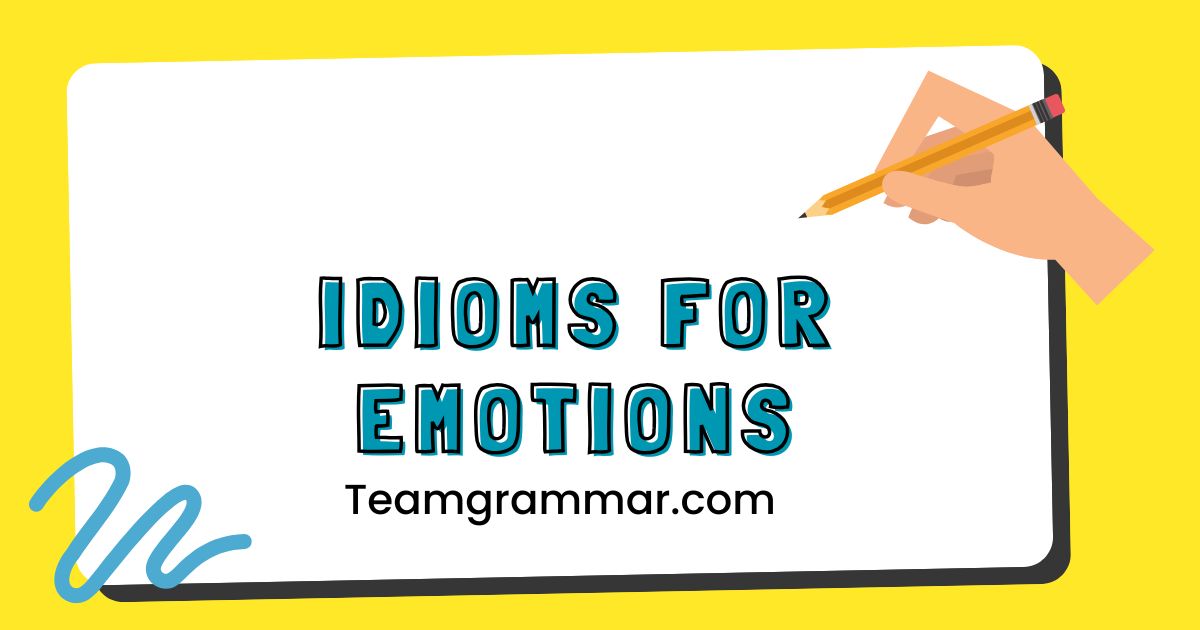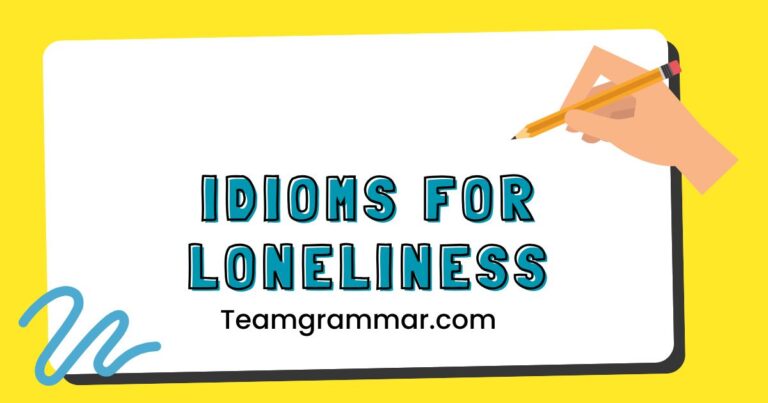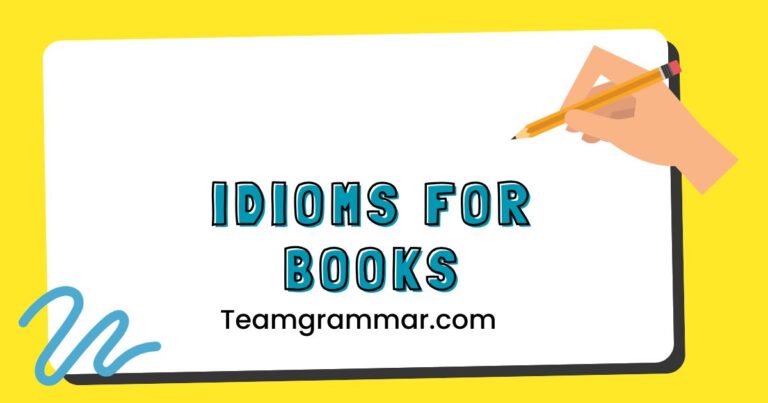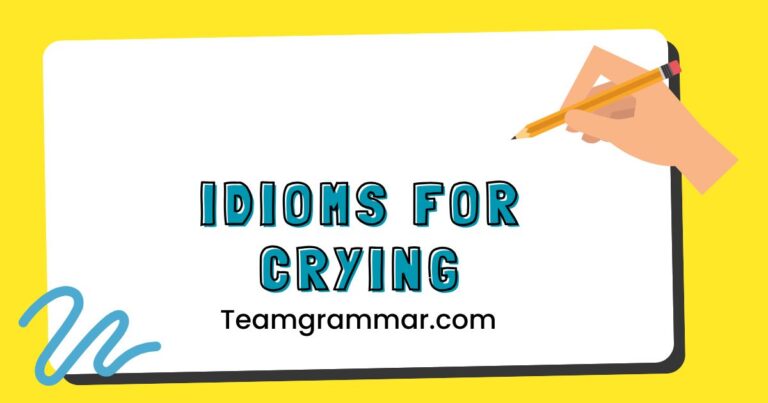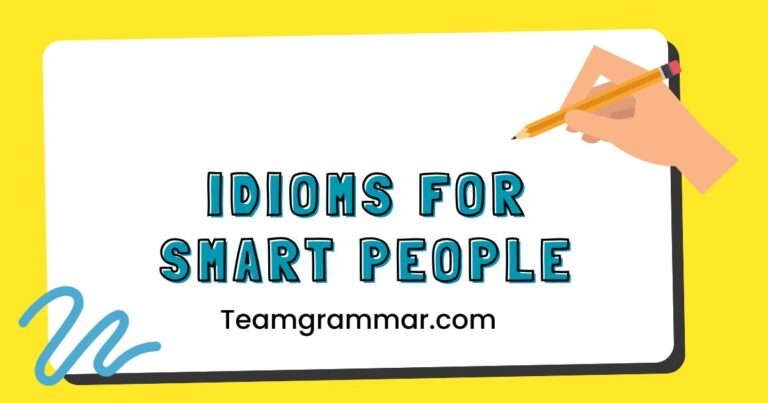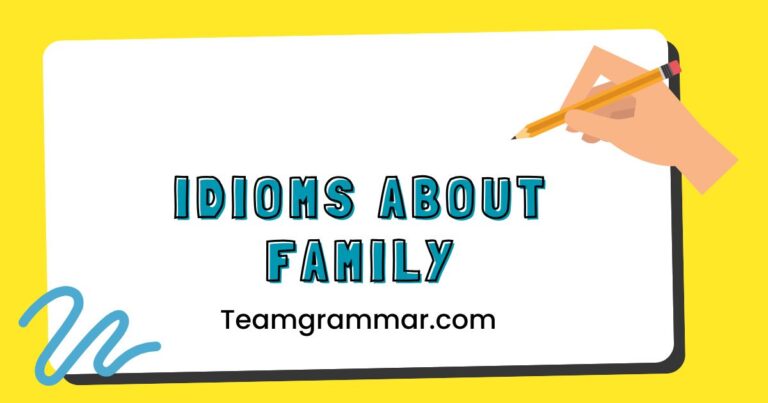49 Idioms for Emotions: Mastering Expressive English
Understanding idioms is crucial for mastering English, especially when it comes to expressing emotions. Idioms add color and depth to your language, allowing you to convey feelings in a way that is both vivid and nuanced.
This article provides a comprehensive guide to idioms related to emotions, helping you understand, use, and appreciate this fascinating aspect of English.
This guide is designed for English language learners of all levels, from beginners who want to expand their vocabulary to advanced speakers who aim to refine their expressive abilities. By the end of this article, you will have a solid grasp of various idioms for emotions and be able to use them confidently in your everyday conversations.
Table of Contents
- Introduction
- What Are Idioms for Emotions?
- Structural Breakdown of Idioms
- Types of Emotional Idioms
- Examples of Idioms for Emotions
- Usage Rules for Idioms
- Common Mistakes with Emotional Idioms
- Practice Exercises
- Advanced Topics: The Nuances of Emotional Idioms
- Frequently Asked Questions
- Conclusion
What Are Idioms for Emotions?
Idioms for emotions are expressions or phrases whose overall meaning differs from the literal meanings of the individual words within them. These idioms offer a colorful and often culturally specific way to express feelings, moods, and emotional states.
They are an integral part of the English language and are used extensively in both spoken and written communication.
Idioms can be classified based on the emotion they represent, such as happiness, sadness, anger, fear, surprise, anxiety, excitement, and disgust. Each category contains a wide array of idioms that provide different shades of meaning and intensity.
Understanding these nuances is key to using idioms effectively and appropriately.
The function of idioms for emotions is to add depth and expressiveness to language. Instead of simply saying “I am happy,” you can say “I am over the moon,” which conveys a stronger sense of joy and excitement.
Idioms also often carry cultural and historical context, making language more engaging and relatable.
Structural Breakdown of Idioms
The structure of idioms can vary significantly. Some idioms are based on metaphors, similes, or other figures of speech, while others have historical origins that are not immediately apparent.
Understanding the structural elements of idioms can help you better grasp their meaning and usage.
Many idioms follow a set pattern, such as: verb + preposition (“get over”), noun + verb (“butterflies in my stomach”), or adjective + noun (“blind rage”). Recognizing these patterns can make it easier to identify and learn new idioms.
However, it’s important to remember that the meaning of an idiom is not simply the sum of its parts.
Here are some common structural patterns found in idioms:
- Verb + Preposition: These idioms often describe a process or action related to an emotion, such as “cheer up” (to become happier).
- Noun + Verb: These idioms often use a noun to symbolize the emotion, such as “heart sank” (to feel disappointed).
- Adjective + Noun: These idioms use an adjective to modify a noun, creating a specific emotional state, such as “bitter disappointment”.
- Similes: Some idioms use similes to compare an emotion to something else, such as “as happy as a clam”.
- Metaphors: Other idioms use metaphors to create a symbolic representation of an emotion, such as “a weight off my shoulders”.
Types of Emotional Idioms
Emotional idioms can be categorized based on the specific emotion they express. Here’s a breakdown of different types of emotional idioms:
Idioms for Happiness
Idioms for happiness express joy, contentment, and satisfaction. These idioms often use vivid imagery and metaphors to convey the intensity of positive emotions.
Idioms for Sadness
Idioms for sadness describe feelings of sorrow, disappointment, and grief. These idioms often use somber and melancholic imagery to convey the depth of negative emotions.
Idioms for Anger
Idioms for anger express feelings of rage, frustration, and irritation. These idioms often use aggressive and intense language to convey the strength of negative emotions.
Idioms for Fear
Idioms for fear describe feelings of anxiety, terror, and apprehension. These idioms often use alarming and unsettling imagery to convey the intensity of negative emotions.
Idioms for Surprise
Idioms for surprise express feelings of astonishment, shock, and wonder. These idioms often use dramatic and exaggerated language to convey the suddenness and intensity of the emotion.
Idioms for Anxiety
Idioms for anxiety describe feelings of worry, unease, and nervousness. These idioms often use restless and apprehensive imagery to convey the discomfort of negative emotions.
Idioms for Excitement
Idioms for excitement express feelings of enthusiasm, anticipation, and eagerness. These idioms often use energetic and lively language to convey the intensity of positive emotions.
Idioms for Disgust
Idioms for disgust describe feelings of revulsion, aversion, and distaste. These idioms often use unpleasant and repulsive imagery to convey the intensity of negative emotions.
Examples of Idioms for Emotions
Here are several examples of idioms for emotions, categorized by the specific emotion they express. Each example is accompanied by a definition and a sample sentence to illustrate its usage.
Happiness Examples
The following table provides 30 examples of idioms for happiness, along with their meanings and example sentences. Understanding these idioms will help you express joy and contentment more vividly.
| Idiom | Meaning | Example Sentence |
|---|---|---|
| Over the moon | Extremely happy | She was over the moon when she got the job offer. |
| On cloud nine | Very happy | After the birth of her child, she was on cloud nine. |
| In seventh heaven | Completely happy | He’s been in seventh heaven since they got engaged. |
| As happy as a clam | Very content | He looked as happy as a clam sitting on the beach. |
| Walking on air | Feeling elated | She’s been walking on air since she met him. |
| Tickled pink | Very pleased | She was tickled pink to receive such a thoughtful gift. |
| Grin from ear to ear | Smiling widely | He was grinning from ear to ear when he heard the news. |
| Full of the joys of spring | Very cheerful and energetic | She’s always full of the joys of spring, no matter what. |
| Have a whale of a time | Enjoy oneself very much | We had a whale of a time at the party last night. |
| Laugh your head off | Laughing a lot | We laughed our heads off at the comedian’s jokes. |
| Jump for joy | To be extremely happy and excited | She jumped for joy when she heard she had won the lottery. |
| Be on top of the world | Feeling amazing and successful | After finishing the marathon, he felt like he was on top of the world. |
| Paint the town red | Go out and celebrate | They decided to paint the town red after their team won the championship. |
| Have a blast | To have a great time | We had a blast at the concert. |
| Be in good spirits | To be happy and cheerful | Despite the challenges, she was in good spirits. |
| Light up | To show happiness or excitement | Her face lit up when she saw her friends. |
| Thrill to bits | To be extremely pleased | She was thrilled to bits with her new car. |
| Be as pleased as punch | Very pleased | He was as pleased as punch with his exam results. |
| Get a kick out of something | To enjoy something very much | I get a kick out of watching old movies. |
| Float/Swim in happiness | To be completely surrounded by happiness | She was floating in happiness after the wedding. |
| Be blessed | To be fortunate and happy | They felt truly blessed to have such a loving family. |
| Make someone’s day | To do something that makes someone very happy | Your kind words really made my day. |
| Be on a high | To feel elated and excited | He was on a high after winning the award. |
| Be in raptures | To be filled with great joy | She was in raptures over the beautiful scenery. |
| Take delight in | To find great pleasure in something | He takes delight in helping others. |
| Rejoice | To feel or show great joy | They rejoiced at the good news. |
| Be tickled to death | To be extremely amused or pleased | She was tickled to death by the surprise party. |
| Bask in the glory | To enjoy the admiration and praise one receives | The team basked in the glory of their victory. |
| Be in a joyful mood | To be feeling happy and cheerful | She was in a joyful mood after the successful presentation. |
| Have the time of your life | To have an exceptionally enjoyable experience | We had the time of our lives on our vacation. |
Sadness Examples
The following table provides 30 examples of idioms for sadness, along with their meanings and example sentences. Understanding these idioms will help you express sorrow and disappointment more effectively.
| Idiom | Meaning | Example Sentence |
|---|---|---|
| Down in the dumps | Feeling sad or depressed | She’s been down in the dumps since she lost her job. |
| Feeling blue | Feeling sad | He’s been feeling blue ever since his girlfriend moved away. |
| Have a heavy heart | Feeling sad and burdened | She had a heavy heart after hearing the news. |
| A lump in one’s throat | A tight feeling in the throat caused by sadness | He had a lump in his throat as he said goodbye. |
| Tears welling up | Eyes filling with tears | Tears welled up in her eyes as she spoke about her loss. |
| Cry your eyes out | To cry a lot | She cried her eyes out after watching the sad movie. |
| Shed tears | To cry | He shed tears when he heard the tragic story. |
| Long face | Sad or disappointed expression | He had a long face when he didn’t get the promotion. |
| Look like death warmed up | To look ill or unhappy | You look like death warmed up; you should get some rest. |
| A shadow of your former self | Not as happy or healthy as you used to be | After the illness, he was just a shadow of his former self. |
| Hit rock bottom | Reach the lowest point in a situation | After losing everything, he hit rock bottom. |
| Inconsolable | Unable to be comforted | She was inconsolable after her pet died. |
| Sing the blues | To express sadness or depression | He’s been singing the blues ever since he broke up with his girlfriend. |
| Have the blues | To feel sad or depressed | I’ve got the blues today because of the rainy weather. |
| Woe is me | Expressing great sorrow | “Woe is me,” she sighed, “I failed the exam.” |
| Mourn a loss | To feel sorrow for someone or something that is lost | They mourned the loss of their family home. |
| Be crestfallen | To be disappointed and dejected | He was crestfallen when he didn’t get the part in the play. |
| Be heartbroken | To be extremely sad or disappointed | She was heartbroken when she found out he was leaving. |
| Be in despair | To be in a state of hopelessness | They were in despair after the company went bankrupt. |
| Weep one’s heart out | To cry a lot because you are very sad | She wept her heart out after the argument. |
| Fall into a funk | To become depressed or unhappy | He fell into a funk after the project was cancelled. |
| Be down in the mouth | To look depressed or unhappy | He was down in the mouth after the team lost the game. |
| Be in the doldrums | To be in a state of inactivity or depression | The business was in the doldrums during the recession. |
| Be in a miserable state | To be extremely unhappy | She was in a miserable state after the breakup. |
| Be on the verge of tears | To be close to crying | She was on the verge of tears when she talked about her struggles. |
| Feel a pang of sadness | To experience a sudden feeling of sadness | He felt a pang of sadness when he saw the old photos. |
| Hangdog look | A dejected or guilty expression | He had a hangdog look after he admitted his mistake. |
| Lament | To express sorrow or regret | They lamented the passing of their beloved leader. |
| Be weighed down | Burdened by sadness or problems | She was weighed down by the stress of her job. |
| Be full of sorrow | To be filled with sadness | He was full of sorrow after the funeral. |
Anger Examples
The following table provides 30 examples of idioms for anger, along with their meanings and example sentences. Understanding these idioms will help you express frustration and rage more effectively.
| Idiom | Meaning | Example Sentence |
|---|---|---|
| See red | To become very angry | He saw red when he found out they had lied to him. |
| Blow a fuse | To lose your temper | She blew a fuse when the kids made a mess in the house. |
| Fly off the handle | To suddenly become very angry | He flew off the handle when he heard the news. |
| Hit the roof | To become very angry | My dad hit the roof when I crashed the car. |
| Foaming at the mouth | To be extremely angry | He was foaming at the mouth after the argument. |
| Chew someone out | To scold someone severely | The boss chewed him out for being late. |
| Give someone a piece of your mind | To express your anger to someone | I’m going to give him a piece of my mind for what he said. |
| Have a short fuse | To get angry easily | He has a short fuse, so be careful what you say. |
| Bite someone’s head off | To speak to someone angrily | She bit my head off when I asked a simple question. |
| Make someone’s blood boil | To make someone very angry | His arrogance makes my blood boil. |
| In a rage | Very angry | He was in a rage after the incident. |
| Livid | Extremely angry | She was livid when she found out about the betrayal. |
| See stars | To be stunned or dazed from anger | He saw stars after the unexpected blow. |
| Hot under the collar | Angry or agitated | He got hot under the collar when they questioned his work. |
| On the warpath | Looking for a fight or confrontation | She’s on the warpath after finding out about the lies. |
| Like a bear with a sore head | In a very bad mood | He’s been like a bear with a sore head all day. |
| Lose your cool | To become angry | He lost his cool during the meeting. |
| Get your back up | To become angry or defensive | He got his back up when I criticized his ideas. |
| Let off steam | To release anger or frustration | He went for a run to let off steam. |
| Go ballistic | To become very angry and irrational | She went ballistic when she found out about the mistake. |
| Be at the end of your tether | To have no patience left | I’m at the end of my tether with these constant delays. |
| Be beside yourself (with anger) | To be extremely angry | He was beside himself with anger after the insult. |
| Choke with anger | To be so angry you can barely speak | She choked with anger as she tried to respond. |
| Harbor resentment | To hold onto feelings of anger and bitterness | He harbors resentment towards his former colleague. |
| Seethe with anger | To feel intense but suppressed anger | She was seething with anger but tried to remain calm. |
| Fly into a rage | To suddenly become very angry | He flew into a rage when he heard the accusations. |
| Simmering with anger | Feeling angry but trying to control it | He was simmering with anger throughout the meeting. |
| Be spoiling for a fight | To be eager to argue or fight | He was spoiling for a fight after the contentious debate. |
| Rub someone the wrong way | To irritate or annoy someone | His comments always rub me the wrong way. |
| Drive someone up the wall/Drive someone crazy | To annoy or irritate someone greatly | The constant noise is driving me up the wall. |
Usage Rules for Idioms
Using idioms correctly requires an understanding of their meaning, context, and cultural nuances. Here are some general rules to follow when using idioms:
- Understand the Meaning: Always make sure you fully understand the meaning of an idiom before using it. Using an idiom incorrectly can lead to confusion or miscommunication.
- Consider the Context: Use idioms that are appropriate for the context of the conversation or writing. Some idioms are more formal than others and should be used accordingly.
- Know Your Audience: Be mindful of your audience. Some idioms may not be familiar to non-native speakers or people from different cultural backgrounds.
- Avoid Overuse: While idioms can add color to your language, overuse can make your speech sound unnatural or contrived. Use them sparingly and appropriately.
- Pay Attention to Grammar: Ensure that the idiom fits grammatically into the sentence. Some idioms have specific grammatical structures that must be followed.
It’s also important to be aware that the meaning of an idiom cannot be derived from the literal meanings of its individual words. Idioms have a figurative meaning that is different from their literal interpretation.
For example, the idiom “break a leg” means “good luck,” not to actually injure someone.
Common Mistakes with Emotional Idioms
One of the most common mistakes is taking idioms literally. For example, someone might misunderstand “feeling blue” to mean they are actually feeling the color blue.
Another mistake is misusing idioms in the wrong context, which can lead to awkward or confusing situations.
Here are some examples of common mistakes and their corrections:
| Incorrect | Correct | Explanation |
|---|---|---|
| She was literally on cloud nine. | She was on cloud nine. | “On cloud nine” is a figurative expression, so “literally” is unnecessary. |
| He hit the ceiling because he was hot. | He hit the roof because he was angry. | “Hit the roof” is an idiom for anger, not literal temperature. |
| I have blue. | I have the blues. | The correct form of the idiom is “have the blues.” |
| She cried her eyes. | She cried her eyes out. | The correct form of the idiom is “cried her eyes out.” |
| He saw red, literally. | He saw red. | The idiom “see red” means to become very angry, and is not literal. |
Another common mistake is using idioms incorrectly due to a misunderstanding of their meaning. For example, “down in the dumps” means feeling sad, so it would be incorrect to use it to describe someone who is feeling excited.
Practice Exercises
Test your understanding of idioms for emotions with these practice exercises. Choose the correct idiom to complete each sentence.
| Question | Options | Answer |
|---|---|---|
| 1. She was __________ when she got the promotion. | a) feeling blue, b) over the moon, c) down in the dumps | b) over the moon |
| 2. He __________ when he found out they had lied to him. | a) saw red, b) felt blue, c) had a heavy heart | a) saw red |
| 3. After losing his job, he was __________. | a) walking on air, b) in seventh heaven, c) down in the dumps | c) down in the dumps |
| 4. She __________ after watching the sad movie. | a) laughed her head off, b) cried her eyes out, c) jumped for joy | b) cried her eyes out |
| 5. He __________ when he heard the good news. | a) hit the roof, b) jumped for joy, c) felt blue | b) jumped for joy |
| 6. She was __________ to receive such a thoughtful gift. | a) tickled pink, b) seeing red, c) feeling blue | a) tickled pink |
| 7. He __________ when I criticized his ideas. | a) let off steam, b) got his back up, c) hit the roof | b) got his back up |
| 8. The constant noise is __________! | a) making my blood boil, b) driving me up the wall, c) seeing stars | b) driving me up the wall |
| 9. She __________ when she heard she had won the lottery. | a) hit the roof, b) jumped for joy, c) saw red | b) jumped for joy |
| 10. They decided to __________ after their team won the championship. | a) feel blue, b) paint the town red, c) be down in the dumps | b) paint the town red |
Exercise 2: Fill in the blanks with the correct idiom.
| Question | Answer |
|---|---|
| 1. After finishing the marathon, he felt like he was __________. | on top of the world |
| 2. I’m going to __________ for what he said. | give him a piece of my mind |
| 3. Despite the challenges, she was __________. | in good spirits |
| 4. He’s been __________ ever since he broke up with his girlfriend. | singing the blues |
| 5. After the company went bankrupt, they were __________. | in despair |
| 6. She had __________ as she said goodbye. | a lump in her throat |
| 7. He __________ when he heard the news. | flew off the handle |
| 8. She was __________ by the surprise party. | tickled to death |
| 9. We __________ on our vacation. | had the time of our lives |
| 10. His comments always __________. | rub me the wrong way |
Advanced Topics: The Nuances of Emotional Idioms
At an advanced level, it’s important to understand the subtle nuances of emotional idioms. This includes recognizing regional variations, historical origins, and the impact of cultural context.
Certain idioms may be more common in specific English-speaking countries or regions, and their meanings can sometimes shift slightly depending on the cultural background.
For instance, an idiom that is considered humorous in one culture may be seen as offensive in another. Similarly, some idioms have historical roots that are not immediately obvious, and understanding these origins can provide deeper insights into their meaning and usage.
Advanced learners should also be able to recognize and interpret the use of emotional idioms in literature, film, and other forms of media.
Another advanced skill is the ability to use emotional idioms creatively and adapt them to different situations. This involves playing with the language, creating new variations, or using idioms in unexpected ways to achieve a specific effect.
However, it’s important to do this with care and sensitivity, as misusing or overusing idioms can detract from the effectiveness of your communication.
Finally, advanced learners should be able to analyze and compare emotional idioms across different languages. This can provide valuable insights into the ways in which different cultures express and understand emotions.
It can also help you to avoid making common translation errors and to communicate more effectively with people from diverse backgrounds.
Frequently Asked Questions
Here are some frequently asked questions about idioms for emotions:
-
What is the difference between an idiom and a literal expression?
An idiom is a phrase whose meaning cannot be understood from the literal meanings of its individual words. A literal expression, on the other hand, means exactly what it says.
-
How can I learn more idioms for emotions?
Read widely, listen to native speakers, and use online resources such as dictionaries and idiom lists. Pay attention to how idioms are used in context and practice using them in your own speech and writing.
-
Is it important to know the origin of an idiom?
While it’s not always necessary, knowing the origin of an idiom can provide deeper insights into its meaning and usage. It can also make the idiom more memorable and easier to understand.
-
Can idioms be translated directly into other languages?
No, idioms usually cannot be translated directly because their meanings are figurative and culturally specific. A direct translation would likely not make sense in the target language.
-
Are some idioms for emotions more formal than others?
Yes, some idioms are more formal and appropriate for professional or academic settings, while others are more casual and suitable for everyday conversations.
-
How can I avoid misusing idioms?
Always double-check the meaning and usage of an idiom before using it. Pay attention to the context and your audience, and avoid using idioms that you are not completely familiar with.
-
Why are idioms important in English?
Idioms add color, depth, and expressiveness to the English language. They allow you to convey emotions and ideas in a more vivid and nuanced way, and they are an integral part of
everyday communication.
Conclusion
Mastering idioms for emotions is a significant step toward achieving fluency and expressiveness in English. By understanding the meanings, structures, and usage rules of these idioms, you can communicate your feelings more effectively and connect with others on a deeper level.
Remember to practice regularly, pay attention to context, and be mindful of your audience. With time and effort, you’ll be able to use idioms for emotions confidently and naturally, adding richness and color to your language.

